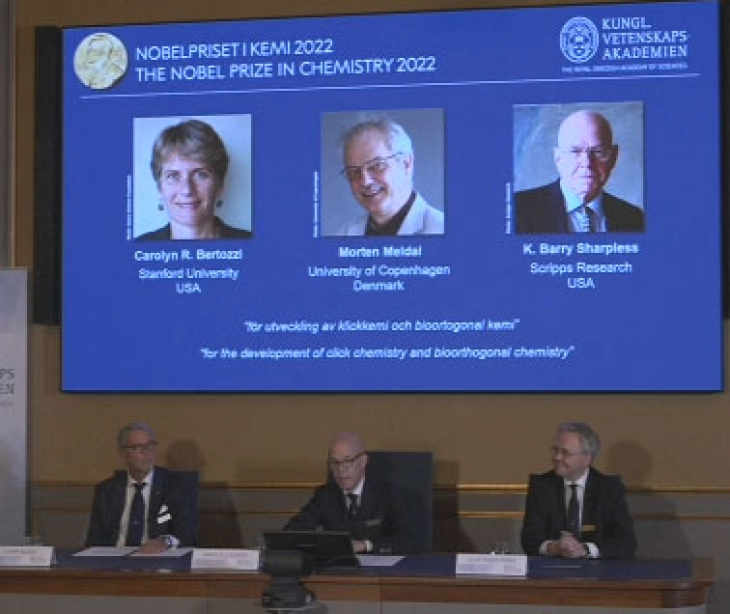Three scientists get Nobel chemistry prize for molecule-building tool

Stockholm, 5 October 2022 (dpa/MIA) - Work on "an ingenious tool for building molecules" - click chemistry and bioorthogonal chemistry - yielded the 2022 Nobel Prize in Chemistry for a trio from Denmark and the US, the Royal Swedish Academy of Sciences announced on Wednesday.
The award will be shared jointly between Carolyn Bertozzi of Stanford University, Morten Meldal of the University of Copenhagen, and Barry Sharpless, of Scripps Research in California.
The award honours their work in a field that allowed "molecular building blocks [to] snap together quickly and efficiently," said the academy.
Sharpless, 81, came up with the theory. Following that, he and Meldal, 68, independently came up with the chemical reaction that is critical to the process. Bertozzi, 56, then built on that work to create reactions that work on living organisms.
Sharpless now holds two Nobel Prizes in Chemistry. His first was awarded in 2001.
Sharpless and Frederick Sanger are the only two-time Chemistry laureates, and two of seven total individuals and organizations to have won a Nobel Prize twice. The Red Cross, for example, has been awarded three Nobel Peace prizes.
The Nobel Prize in Chemistry 2022 "is about making difficult processes easier," the Nobel Committee for Chemistry explained.
In click chemistry, molecular building blocks snap together quickly and efficiently. Bertozzi took it to a new dimension and started utilising it in living organisms. Bertozzi's "bioorthogonal reactions take place without disrupting the normal chemistry of the cell," the academy says.
The reaction pioneered here is very popular both in research and in industry because it makes it very easy to connect molecules.
Although the process builds molecules unlike those found in nature, they often perform the required function.
The theory developed by Bertozzi, Meldal and Sharpless can be used to explore cells, track biological processes and create better ways to target cancer, for example. This is already being tested in clinical trials.
"This year’s Prize in Chemistry deals with not overcomplicating matters, instead working with what is easy and simple. Functional molecules can be built even by taking a straightforward route," says Johan Åqvist, Chair of the Nobel Committee for Chemistry.
Professor Bertozzi could barely believe the news. "I'm absolutely stunned. I'm sitting here and can hardly breathe," the US scientist said to Professor Hans Ellegren, who called her on the phone with the announcement.
To Ellegren's question of whether she was shocked by the news, Bertozzi responded, "that's an understatement. I'm still not entirely positive that it's real."
Bertozzi is the first woman among this year's winners. The Nobel Prizes in medicine and physics went exclusively to men on Monday and Tuesday.
She is also notably one of very few openly gay laureates of all time.







